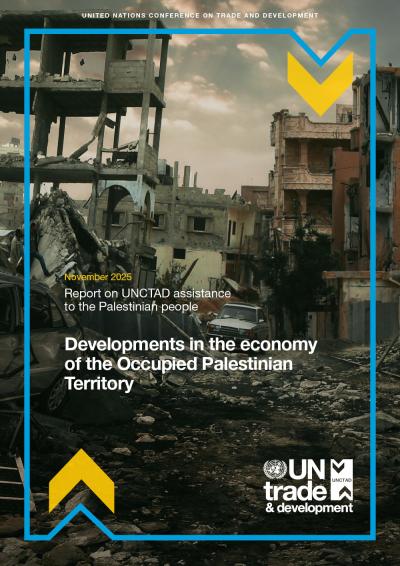
In 2024, the Palestinian economy experienced its steepest decline amid the escalation of hostilities that devastated critical infrastructure, including factories, businesses, hospitals, schools, universities, residential buildings and banks, along with vital energy, water, telecommunications and agriculture assets.
Decades of development lost
The military operations have had significant macroeconomic repercussions.
- By 2024, the Occupied Palestinian Territory’s gross domestic product (GDP) had fallen to 70% of the 2022 level, with output shrinking by 27% compared with in 2023.
- This decline led to a 33% drop in GDP per capita levels from 2022 levels 28% drop in GDP per capita from 2023 levels.
- By the end of 2024, GDP per capita had fallen to 2003 levels, erasing 22 years of economic progress in only 15 months.
- The cost of living has risen across the Occupied Palestinian Territory, with the consumer price index rising by 54% in 2024, exacerbating a scarcity and affordability crisis.
- By October 2024, half of all Palestinians seeking work were unemployed, an increase from 24% in 2022.
- The Palestinian Human Development Index is projected to fall from 0.716 in 2022 to 0.643 in 2024, erasing a quarter of a century of hard-won progress.
The worst fiscal crisis to date
Over 25 years since its expected expiry in 1999, the Paris Protocol continues to define the revenue clearance mechanism, whereby Israel collects taxes on all Palestinian imports and transfers the revenue to the Palestinian Government on a monthly basis.
This arrangement leaves over two-thirds of Palestinian fiscal revenue under the control of Israel, which can, and often does, suspend transfers and apply unilateral deductions.
The chronic fiscal crisis has worsened since October 2023, marking 2024 as the worst fiscal year in the history of the Palestinian Government.
Between January 2019 and April 2025, cumulative deductions and withheld amounts surpassed $1.76 billion, equivalent to 12.8% of GDP in 2024 and 44% of total Palestinian net revenues.
The survival of Gaza hangs in the balance
While the downturn was severe across Palestine, Gaza has experienced the most devastating impact.
- In 2024, GDP contracted by 83% compared with 2023, following an already significant decline that year.
- GDP per capita dropped to $161, among the lowest in the world and just 6.4% of the 2005 peak. The economic collapse in Gaza is among the most significant economic contractions in recent history.
- Restrictions on the entry of humanitarian and commercial goods triggered a surge in inflation of 238%.
- Unemployment soared to 80%. Mass joblessness and rising prices have pushed the entire population of Gaza below the poverty line.
- By April 2025, 70% of the structures in Gaza had been damaged.
- The cumulative impact of bombing between October 2023 and May 2025 is estimated to have led to a 73% decrease in night-time luminosity, an indicator of reduced economic activity.
- According to estimates, over 69 years of human development have already been lost.
- The crisis in Gaza is the most severe ever recorded based on the Uppsala (Sweden) Conflict Data Programme data set.
In an optimistic scenario of double-digit growth rates facilitated by a significant level of foreign aid, it will still take several decades for Gaza to return to pre-October 2023 welfare levels.
The international community should act to ensure a permanent ceasefire immediately and, once recovery commences, prioritize life-saving interventions, including access to essential health care, both physical and mental, clean water and the restoration of basic infrastructure.
Urgent measures are needed to provide income support and employment opportunities and to safeguard vulnerable small and medium-sized enterprises.
The proposal for a universal emergency basic income in Gaza has gained greater relevance and urgency as the entire population faces extreme, multidimensional impoverishment.






